- Home
- Sue Grafton
R Is for Ricochet Page 4
R Is for Ricochet Read online
Page 4
Dirk was in the process of making a margarita for Owen, ice clattering in the blender. With his attention occupied I had an opportunity to study him. He was tall, compared with his brother, over six feet while Neil topped out closer to my height at five-feet-seven. His hair was sandy, lightly dusted with gray. He was lean, an ectomorph, where Neil's build was stocky. Blue eyes, white lashes, a good-size nose. He glanced over at me and I dropped my gaze discreetly to Meg. He wore chinos and a navy short-sleeved shirt that revealed the light downy hair along his forearms. His teeth were good and his smile seemed sincere. On a scale of 1 to 10 - 10 being Harrison Ford - I'd place him at 8, or maybe even 8 plus plus.
He moved to the counter where I was standing and helped himself to a canap‚. We chatted idly, exchanging the sort of uninspired questions and answers that tend to pass between strangers. He told me he was visiting from New York, where he worked as an architect, designing residential and commercial structures. I told him what I did and how long I'd done it. He feigned more interest than he probably felt. He told me he and Neil had three other brothers, of which he was the second from the bottom of the heap. Most of the family, he said, was scattered up and down the East Coast with Neil the lone holdout in California. I told him I was an only child and let it go at that.
Eventually, Neil and Vera came downstairs. She took the baby and settled on the couch. Vera fiddled with her shirt, popped a boob out, and began to breast-feed while Owen and I made a point of looking somewhere else. Eventually several other couples arrived. There were introductions all around as each new twosome was incorporated. The kitchen was gradually taken up with guests, standing in small groups, some spilling into the hallway and out onto the deck. When the babysitter arrived, Vera took Meg upstairs and returned wearing a different shirt. The noise level rose. Owen and I were separated by the crowd, which was all right with me as I'd run out of things to say to him.
I made an effort to be friendly, chitchatting with any poor soul who caught my eye. Everyone seemed nice enough, but social gatherings are exhausting to someone of my introverted nature. I endured it as long as I could and then eased toward the foyer where I'd left my shoulder bag. Good manners dictated that I say thank you and good- bye to host and hostess, but neither were in sight and I thought it'd be expedient to tiptoe away without calling attention to my escape.
As I closed the front door and made my way down the wooden porch stairs, I caught sight of Cheney Phillips coming up the walk in a deep red silk shirt, cream dress pants, and highly polished Italian loafers. Cheney was a local cop, working vice last I heard. I tended to run into him at a dive called the Caliente Caf‚ - also known as CC's - off Cabana Boulevard by the bird refuge. Rumor had it he'd met a girl at CC's and the two had taken off for Vegas to get married a scant six weeks later. I remembered the pang of disappointment with which I'd greeted the news. That was three months ago. He said, "Leaving so soon?"
"Hey, how are you? What are you doing here?"
He tilted his head. "I live next door."
I followed his gaze to the house, another two-story Victorian that appeared to be a twin of the one I'd just left. Not many cops can afford the tab on a Santa Teresa residence of that size and vintage. "I thought you lived in Perdido."
"I did. That's where I grew up. My uncle died, leaving me a great whack of dough so I decided to invest it in real estate." He was probably thirty-four, three years younger than I, with a lean face and a mop of dark curly hair, five-eight or so, and slim. He'd told me that his mother sold high-end real estate and his father was X. Phillips who owned the Bank of X. Phillips in Perdido, a town thirty miles to the south. He'd clearly been raised in an atmosphere of privilege.
"Nice house," I said.
"Thanks. I'm still getting settled or I'd offer you a tour."
"Maybe another time," I said, wondering about his wife.
"What are you up to these days?"
"Nothing much. A little this and that."
"Why don't you return to the party and have a drink with me? We should talk."
I said, "Can't. I have to be someplace and I'm late as it is."
"Rain check?"
"Of course."
I waved, walking backward for a moment before I turned and headed to my car. Now why had I said that? I could have stayed for a drink, but I couldn't face another minute in that crowd. Too many people and too much chitchat.
I was home again by 6:15, relieved to be alone but feeling let down nonetheless. Given that I hadn't wanted to meet Vera's brother-in-law in the first place, I was disappointed-the blind date had turned out to be a bland date. Nice guy, no sparks, which was probably just as well. Sort of. It was entirely possible the regrets were attached to Cheney Phillips instead of Owen Hess, but I didn't want to deal with that. What was the point?
4
I left for the prison at 6:00 Monday morning. The drive was boring and hot, my route taking me from Santa Teresa down the 101 as far as Highway 126, which cuts inland at Perdido. The road runs between the Santa Clara River on the right and a fencework of power lines on the left, skirting the southern reaches of the Los Padres National Forest. I'd seen contour maps of the area, which detailed numerous hiking trails through that bleak and mountainous terrain. Dozens of creeks are threaded along the canyon floors. There are a surprising number of public campgrounds distributed throughout the 219,700 acres that constitute the wilderness. HI weren't preternaturally opposed to bugs, black bears, rattlesnakes, coyotes, heat, stinging nettles, and dirt, I might enjoy seeing the rumored sandstone cliffs and pines growing at odd angles along the boulder-strewn hills. In years past, even from the safety of the highway, I sometimes spotted one of the last of the California condors circling in the sky, its ten-foot wingspan stretched out as gracefully as a soaring kite.
I passed countless avocado orchards and citrus groves laden with ripening oranges, with produce stands set up every two to three miles. I caught a red light in each of three small communities of newly constructed housing and lavish shopping malls. An hour and a half later, I reached the junction of the 125 and Highway 5, which I followed to the south. It took me another hour to reach Corona. The incarceration-prone family couldn't do much better than to serve their separate bids in this area, which has the California Youth Authority, the California Institution for Men, and the California Institution for Women all within shooting range of one another. The land was flat and dusty, interrupted by power lines and water towers, parcels separated by low barbed-wire fences. A thin line of trees appeared at intervals, but it was hard to see the point. They provided no shade and only the sparsest screening from the cars speeding by. The houses had flat roofs and looked shabby, with dilapidated outbuildings. There were thick, knobby trees, whose amputated branches were, if not dead, devoid of foliage. As is true of most raw acreage in California, housing developments were taking root like a slew of weeds.
By 8:30 I found myself sitting in my car in the parking lot adjacent to the Processing Center at the California Institution for Women. For years, the CIW was known as Frontera, the feminine derivative of the word frontier. The 120-acre campus (as they referred to it back then) opened in 1952, and until this year, 1987, it was the only facility in California housing female felons. I'd already been inside the building where I showed the officer my photo ill and told him I was there to pick up Reba Lafferty, whose CDC number was, by an amusing coincidence, the same as my birthdate. The officer checked his roster, found her name, and then called Receiving and Release.
He'd suggested that I wait in the parking lot, so I'd hoofed it back to my VW. So far, the community of Corona seemed a bit grim for my taste. A trail of yellow smog hung on the horizon like something a crop-dusting plane might have left in its wake. The mid-July heat was as thick as soured milk and smelled of feedlots. A buffeting wind was blowing and there were flies everywhere. My T-shirt was sticking to my back and I could feel a sheen of moisture on my face - the sort of clamminess that wakes you from a dead sleep when yo
u've just come down with the flu.
The view through the ten-foot chain-link fences was an improvement. I could see green lawns, walkways, and hibiscus plants with showy red and yellow blossoms. Most of the buildings were dun-colored and built close to the ground. Female inmates strolled the yards in groups of two and three. I knew from reading I'd done that construction had just been completed on a 110-bed Special Housing Unit. Total staff was 500, give or take a few, while the prison population varied between 900 and 1,200. Whites were in the majority, with ages bunched in the thirty-to-forty range. The prison provided both academic and vocational programs, including computer programming. Prison industries, largely textiles, produced shirts, shorts, smocks, aprons, handkerchiefs, bandannas, and fire-fighting clothing. Frontera also served as a hub for the selection and training of firefighters, who would be assigned work in the forty-some conservation camps across the state.
For the umpteenth time, I looked at the snapshot of Reba Lafferty taken before her legal ills and her felony quarantine. If she'd abused alcohol and drugs, the excess didn't show. Restlessly, I returned the photo to my shoulder bag and fiddled with the tuner on the radio. The morning news was the usual disheartening mixture of murder, political shenanigans, and dire economic predictions. By the time the news anchor cut to the station break, I was ready to cut my own throat.
At 9:00 A.M. I glanced up and caught sight of activity near the vehicle sally port. The gates had been rolled back and an outbound sheriffs department van now idled while the driver presented his paperwork to the sally port officer. The two of them exchanged pleasantries. I got out of my car. The van pulled through the gate, made a wide right-hand turn, and then slowed to a stop. I could see a number of women onboard, parolees headed for the real world, their faces turned to the window like a row of plants seeking light. The doors to the van hissed open and closed, and then the vehicle moved off.
Reba Lafferty stood on the pavement in prison-issue tennis shoes, blue jeans, and a plain white T-shirt without benefit of a brassiere. All inmates are obliged to surrender their personal clothing on arrival at the prison, but I was surprised her father hadn't sent her something of her own to wear home. I knew she'd been compelled to purchase the outfit she wore since the articles were considered government property. She'd apparently declined the prison-issue bra, which was probably about as flattering as an orthopedic brace. Inmates are also required to leave prison without anything in hand, except their two hundred bucks in cash. Startled, I saw that she looked exactly like the photo. Given Nord Lafferty's advanced age, I'd pictured Reba in her fifties. This girl was barely thirty.
Her hair was now cropped short and looked damp from a shower. During her incarceration, the blond had grown out and the natural dark strands were spikey, as though she'd stiffened them with mousse. I expected her to be heavy, but she was trim almost to the point of looking frail. I could see the bony hollows of her collarbones beneath the cheap fabric of her T-shirt. Her complexion was clear but faintly sallow, and her eyes were smudged with dark shadows. There was something sensual about her; a defiance in her posture, a touch of swagger in her walk.
I lifted my hand in greeting and she crossed the road, moving in my direction.
"You here for me?"
"That's right. I'm Kinsey Millhone," I said.
"Great. I'm Reba Lafferty. Let's hit the friggin' road," she said as we shook hands.
We walked to the car and for the next hour, that was the extent of our conversation.
I prefer silence to small talk so the lack of chitchat wasn't awkward. I varied my route, catching Highway 5 south until it intersected the 101. A couple of times I thought of asking her a question, but I didn't think the ones that came to mind were any of my business. Why'd you steal the money and How'd you screw it up and get caught being foremost.
It was Reba who finally broke the silence. "Pop told you why I was in?"
"He said you took money, but that's all," I said. I noticed that I'd bypassed the word 'embezzlement,' as though it might be rude to name the crime that resulted in her prison term.
She rested her head against the back of the seat. "He's a love. He deserves a lot better than me."
"May I ask how old you are?"
"Thirty-two."
"No offense, but you look about twelve. How old was your dad when you were born?"
"Fifty-six. My mother was twenty-one. There's a match made in heaven. No telling what her deal was. She dropped me like a litter of kittens and hit the road."
"Does she keep in touch?"
"Nope. I saw her once, when I was eight. We spent one day together - well, half a day. She took me to Ludlow Beach and watched me splash in the waves until my lips turned blue. We had lunch at that snack stand, you know the one near High Ridge Road?"
"Know it well."
"I had a milk shake and ate fried clams, which I haven't eaten since. I must have been hyper. I remember my stomach was full of butterflies from the minute I woke up, knowing she'd be there. We were on our way to the zoo when I got sick in the car and she ended up taking me home."
"What'd she want?"
"Who knows? Whatever it was, she hasn't wanted it since. Pop's been great, though. I'm lucky in that regard."
"He feels guilty about you."
She turned and looked at me. "How come? None of this is his fault."
"He thinks he neglected you when you were young."
"Oh. Well, he did, but what's that got to do with it? He made his l choices and I made mine."
"Yeah, but generally speaking, it's better to avoid the ones that are going to land you in jail."
She smiled. "You didn't know me back then. I was either drunk or I stoned and sometimes both."
"How'd you hold down a job?"
"I saved the drinking for nights and weekends. I smoked dope before and after work. I never did the hard stuff-heroin, crack, or speed. Those can really mess you up bad."
"Didn't anyone ever notice you were stoned?"
"My boss."
"How'd you manage to take the money? Seems like that would necessitate a clear head."
"Trust me, I was always clear about some things. Have you ever been in jail?"
"I did an overnight once," I said, making it sound like an outing with my Girl Scout troop. "For what?"
"Assaulting a cop and resisting arrest."
She laughed. "Wow. Who'da thunk? You look like a real button-down type. I'll bet you cross the street with the light and never fudge the numbers on your tax return."
"Well, true. Is that bad?"
"No, it's not bad. It's just boring," she said. "Don't you ever want to cut loose? Take a risk and maybe blow yourself through the roof?"
"I like my life as it is."
"What a drag. I'd go nuts."
"What makes me nuts is being out of control."
"So what do you do for laughs?"
"I don't know... I read a lot and I jog."
She looked at me, waiting for the punch line. "That's it? You read a lot and you jog?"
I laughed. "It does sound pathetic when you think of it."
"Where do you hang out?"
"I don't do any 'hanging out' as such, but if I want dinner or a glass of wine, I usually go to a tavern in my neighborhood called Rosie's. The owner's a mama bear, which means I can eat without being has- sled by guys on the make."
"You have a boyfriend?"
"Not so's you'd notice," I said, slipping into the vernacular. Better not to let her venture too far down that path. I glanced over at her. "If you don't mind my asking, have you been in trouble before?"
She turned to look out the passenger-side window. "Depends on your point of reference. I went through drug rehab twice. I did six months in county jail on a bad-check charge. By the time I got out, my finances were in the shitter so I declared bankruptcy. Here's the weird part. Once I filed? I got a ton of credit card offers in the mail and all of them were preapproved. How could I resist? Of course, I ran those up, too.
Thirty thousand bucks' worth before the gates clanged shut."
"Thirty thousand for what?"
"Oh, you know. The usual. Gambling, drugs. I blew a bunch at the track and then went to Reno where I played the slots. I sat in on some high-stakes poker, but the cards were running cold. Not that I'd quit because of that. I figured I could only lose so many times before the game turned around and started working my way. Unfortunately, I never reached that point. Next thing you know, I was broke and living on the streets. That was 1982. Pop moved me into his house and then he cleaned up my debts. What about your vices? You must have one."
"I drink wine and the occasional martini. I used to smoke cigarettes, but then I gave that up."
"Hey, me, too. I quit a year ago. Talk about tough."

 S Is for Silence
S Is for Silence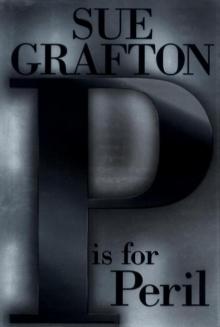 P Is for Peril
P Is for Peril R Is for Ricochet
R Is for Ricochet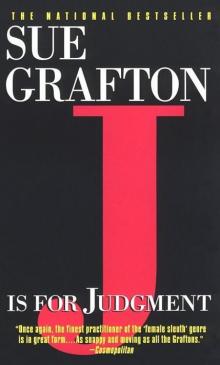 J Is for Judgment
J Is for Judgment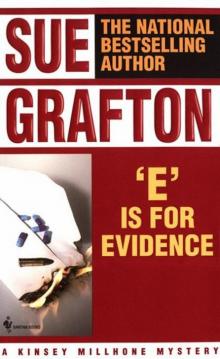 E Is for Evidence
E Is for Evidence T Is for Trespass
T Is for Trespass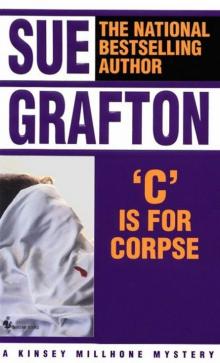 C Is for Corpse
C Is for Corpse U Is for Undertow
U Is for Undertow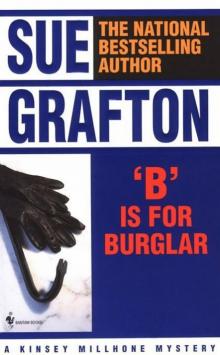 B Is for Burglar
B Is for Burglar Four Sue Grafton Novels
Four Sue Grafton Novels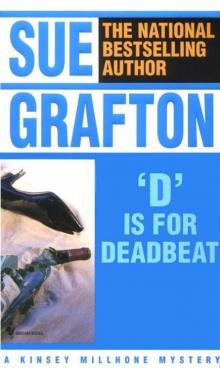 D Is for Deadbeat
D Is for Deadbeat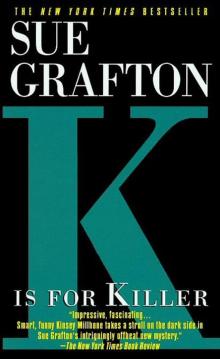 K Is for Killer
K Is for Killer I Is for Innocent
I Is for Innocent A Is for Alibi
A Is for Alibi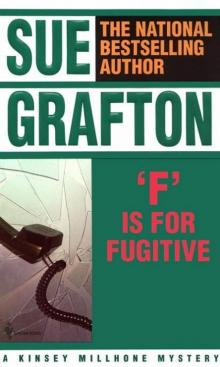 F Is for Fugitive
F Is for Fugitive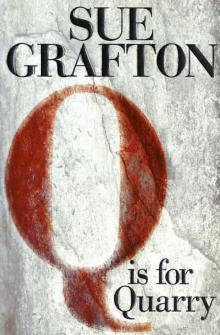 Q Is for Quarry
Q Is for Quarry W Is for Wasted
W Is for Wasted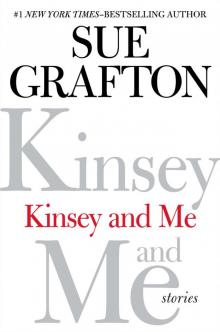 Kinsey and Me: Stories
Kinsey and Me: Stories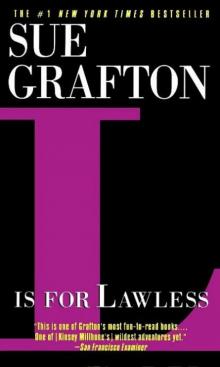 L Is for Lawless
L Is for Lawless Y Is for Yesterday
Y Is for Yesterday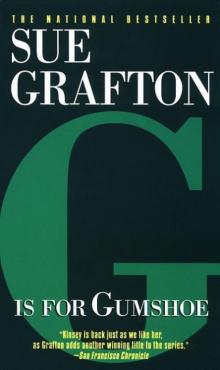 G Is for Gumshoe
G Is for Gumshoe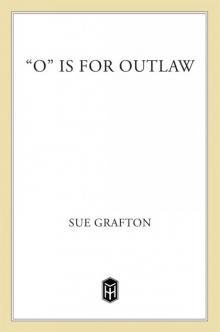 O Is for Outlaw
O Is for Outlaw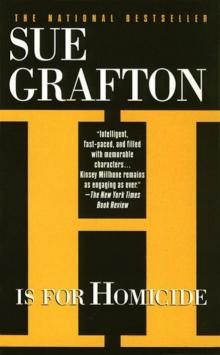 H Is for Homicide
H Is for Homicide X
X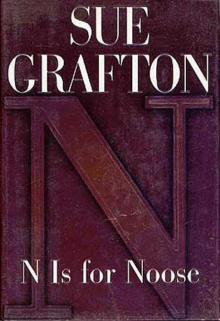 N Is for Noose
N Is for Noose Three Complete Novels: A Is for Alibi / B Is for Burglar / C Is for Corpse
Three Complete Novels: A Is for Alibi / B Is for Burglar / C Is for Corpse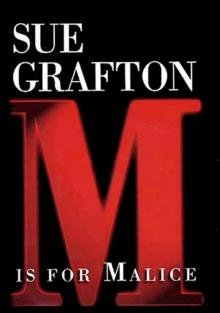 M Is for Malice
M Is for Malice I is for INNOCENT
I is for INNOCENT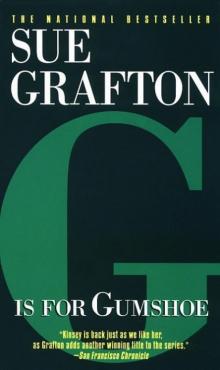 G is for GUMSHOE
G is for GUMSHOE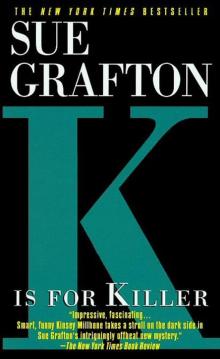 K is for KILLER
K is for KILLER S is for SILENCE
S is for SILENCE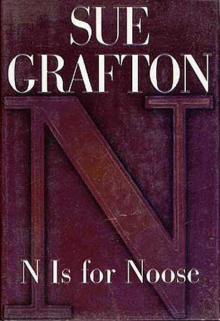 N is for NOOSE
N is for NOOSE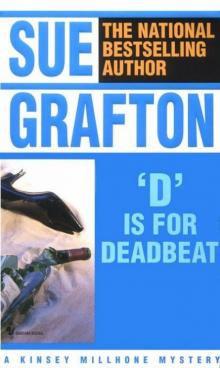 D is for DEADBEAT
D is for DEADBEAT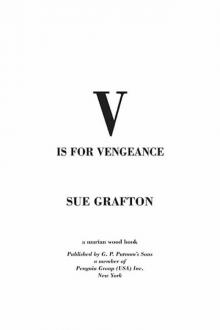 V is for Vengeance
V is for Vengeance U is for Undertow
U is for Undertow W Is for Wasted km-23
W Is for Wasted km-23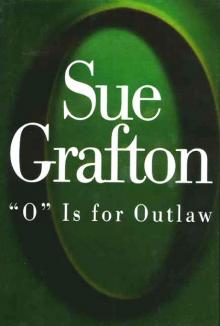 O is for OUTLAW
O is for OUTLAW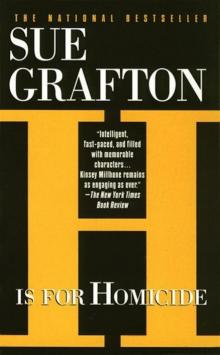 H is for HOMICIDE
H is for HOMICIDE Sue Grafton Novel Collection
Sue Grafton Novel Collection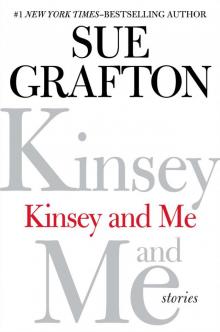 Kinsey and Me
Kinsey and Me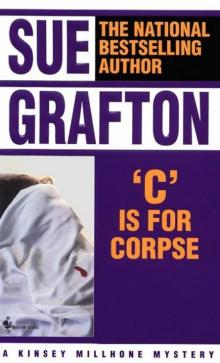 C is for CORPSE
C is for CORPSE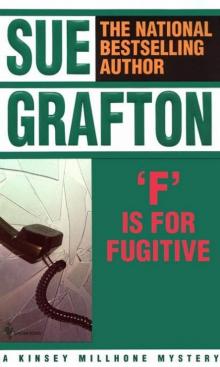 F is for FUGITIVE
F is for FUGITIVE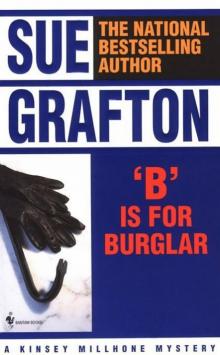 B is for BURGLAR
B is for BURGLAR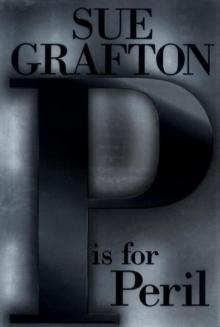 P is for PERIL
P is for PERIL A is for ALIBI
A is for ALIBI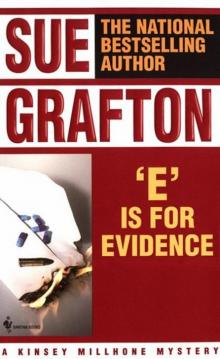 E is for EVIDENCE
E is for EVIDENCE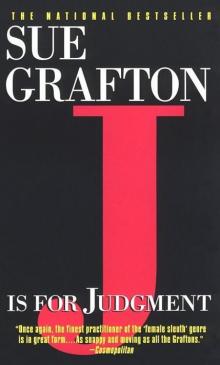 J is for JUDGMENT
J is for JUDGMENT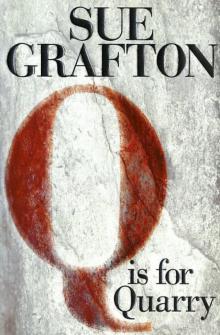 Q is for QUARRY
Q is for QUARRY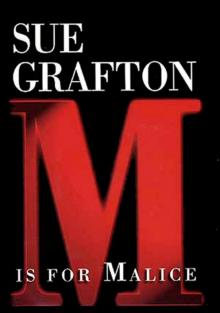 M is for MALICE
M is for MALICE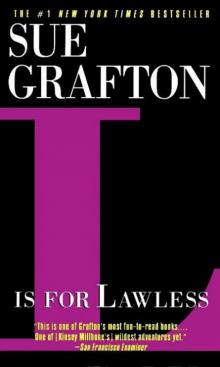 L is for LAWLESS
L is for LAWLESS